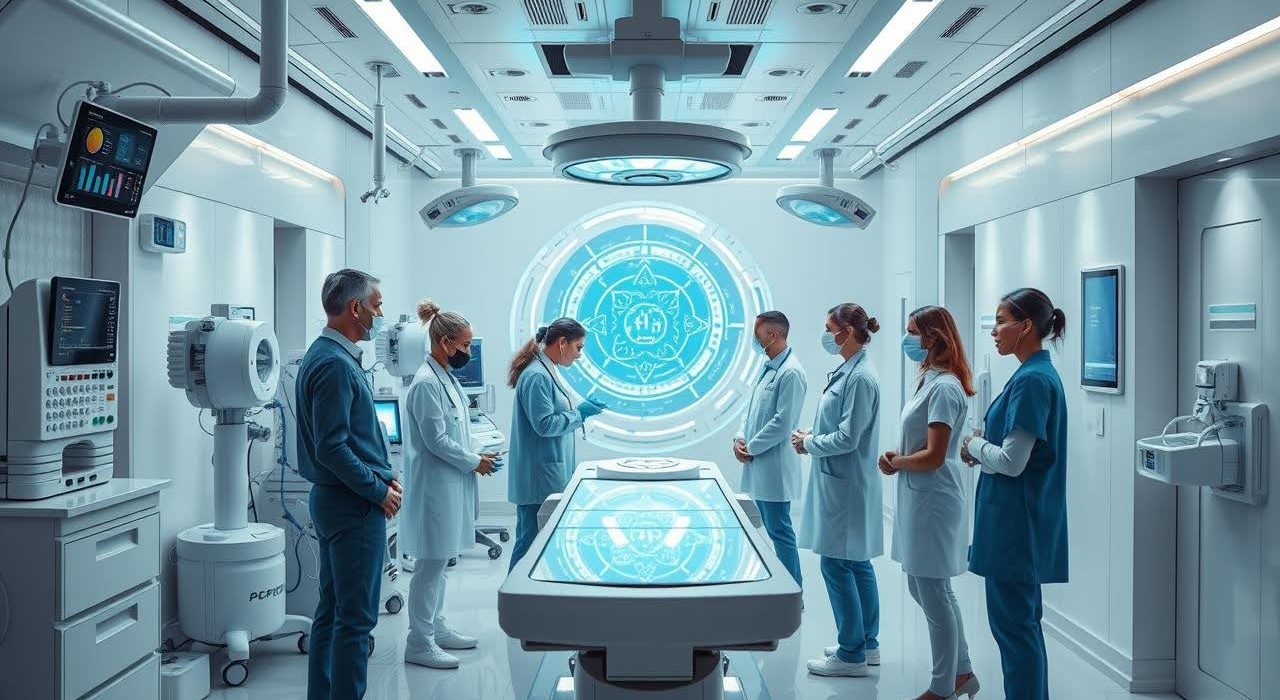Artificial intelligence is changing healthcare fast, making it better and more efficient. AI helps doctors and nurses work smarter, not harder. It looks at lots of data quickly, helping them make better choices.
Studies by Accenture show AI could save healthcare over $150 billion by 2026. This shows how big of a difference AI can make in care quality and efficiency.
“Futuristic healthcare setting with a glowing AI inteTakeaways
- AI is transforming traditional clinical practices in healthcare.
- AI technologies enhance decision-making efficiency and accuracy.
- Data analysis by AI leads to better patient outcomes.
- AI is projected to save the healthcare sector over $150 billion by 2026.
- The AI revolution in healthcare is fundamentally changing patient care.
- Integrating AI in clinical practice is beneficial for both healthcare professionals and patients.
Introduction to Artificial Intelligence in Healthcare
Artificial Intelligence (AI) is changing healthcare a lot. It uses technologies like machine learning and natural language processing. These help make healthcare better and more efficient.
More and more hospitals are using AI. A recent report says over 30% of hospitals now use AI. This helps manage data and keep an eye on patients better.
AI is making healthcare safer and more effective. It helps doctors make accurate diagnoses. This leads to better care for patients.
Understanding Clinical Practice
Clinical practice covers a wide range of activities aimed at giving top-notch patient care. Doctors, nurses, and other health professionals work together. They make sure patients get the right care for their needs. They work at different levels of care, like primary, secondary, and tertiary.
Primary care is where patients first go. It focuses on preventing problems and treating them early. Secondary care deals with more complex issues and needs a referral. Tertiary care is for the most serious cases, offering advanced treatments.
It’s key for healthcare providers to work well together for good patient care. Knowing how clinical practice works shows the importance of teamwork. With new tech like artificial intelligence, providers must learn to use these tools together.
Revolutionizing Healthcare Through AI
Artificial Intelligence is changing healthcare a lot. It’s making patient care better and helping doctors diagnose faster. AI is making treatments quicker and more accurate. It’s also making healthcare more focused on the patient.
The Impact on Patient Care
The role of AI in patient care is huge. It uses predictive analytics to understand patients better. This lets doctors treat problems before they get worse.
AI helps create treatment plans that fit each patient. This leads to better health and happier patients.
Enhancing Diagnostic Accuracy
AI is getting better at diagnosing diseases, especially in cancer. It uses big data to make accurate diagnoses. This means doctors can act faster, saving lives.
AI is giving doctors better tools to make decisions. This improves patient care a lot.
The Benefits of AI in Clinical Settings
AI in clinical settings brings many advantages. It improves both administrative tasks and patient care. This leads to better efficiency and outcomes for patients.
Reducing Administrative Burden
AI is great at cutting down on paperwork. It automates tasks like scheduling and billing. This lets healthcare workers spend more time with patients.
Studies show a big drop in workloads. This highlights how AI is changing healthcare for the better.
Improving Treatment Planning
AI is also a game-changer in treatment planning. It uses patient data to suggest personalized care plans. This makes healthcare more precise and patient satisfaction higher.
AI helps doctors make quicker, better decisions. It ensures they meet patient needs more effectively.
A futuristic clinic interior featuring advanced AI technology seamlessly integrated into medical workflows, bright and clean environment, medical professionals collaborating with AI-driven diagnostic tools, holographic displays of patient data, robots assisting in surgeries, vibrant colors emphasizing innovation and efficiency, soft lighting creating a welcoming atmosphere.
Challenges and Limitations of AI in Clinical Practice
AI technology in healthcare faces many challenges. One big issue is data privacy. Patient information could be leaked, raising ethical and legal concerns. Keeping this data safe is a big task for healthcare groups.
Another problem is algorithm biases. AI learns from old data, which might be biased. This can lead to unfair treatment of certain patients. Overcoming these biases is hard, making fair healthcare hard to achieve.
Costs are also a big barrier. Using AI requires a lot of money for new tech and training. Small clinics struggle to afford this, making AI less accessible to all.
Healthcare workers are also skeptical. They question AI’s trustworthiness, especially when compared to human decisions. Building trust in AI needs good training and constant checks.
Integration of AI Technologies in Healthcare Systems
AI technologies are changing healthcare for the better. They make patient care more efficient and streamlined. Tools like AI with EHR help manage data and track patients better. Machine learning in medicine also boosts diagnostic skills, helping doctors make better decisions.
AI and Electronic Health Records (EHR)
AI with EHR systems change how we handle medical data. They automate tasks, reducing errors and keeping patient info current. These systems use predictive analytics to spot health risks early.
Machine Learning Algorithms in Diagnosis
Machine learning in medicine is a big step forward in diagnosis. It uses huge amounts of data to find patterns that help doctors diagnose diseases better. Studies show these algorithms can lower misdiagnosis rates and improve patient care.
| Feature | AI with EHR | Machine Learning in Diagnosis |
| Data Management | Automates data entry and updates, improving efficiency | N/A |
| Patient Safety | Identifies potential health risks early | Reduces misdiagnosis rates significantly |
| Diagnostic Assistance | N/A | Extracts diagnostic patterns from large datasets |
| Real-time Insights | Provides up-to-date patient information | Delivers predictive insights for better treatment planning |
A futuristic hospital scene showcasing advanced AI integration in healthcare, featuring robotic assistants interacting with medical professionals, digital health screens displaying patient data, and AI algorithms visualized as vibrant neural networks, all harmoniously blending human and machine elements.
Ethical Considerations in AI Usage
The use of artificial intelligence in healthcare raises big ethical questions, especially about keeping patient data private. As doctors use AI to look at health info, it’s key to keep this data safe and private. This not only builds trust with patients but also makes sure medical practices follow the law.
Getting informed consent is crucial for using AI ethically. Patients need to know how their data will be used and kept. This openness makes patients feel valued and safe when they share their health info. Groups like the American Medical Association offer guidelines to help tackle these issues and set up ethical rules.
Being open about how AI algorithms work is also key. Developers and healthcare teams should explain what their AI systems can and can’t do. This clarity helps doctors make better choices, ensuring patients get the best care. It also makes sure AI systems in clinics are accountable.
Experts and legal bodies are pushing for rules on using AI ethically. Good policies can lower risks of misuse and set a standard for ethical use in
Case Studies: Successful Implementation of AI in Clinical Practice
AI case studies in healthcare show how artificial intelligence changes clinical practices. Many hospitals and healthcare providers have seen great results from using AI. For instance, a major medical center used AI for early cancer detection.
The machine-learning algorithm improved diagnostic accuracy. This led to earlier interventions, which helped patients’ outcomes.
Another example is a healthcare facility that used predictive analytics to better patient care. The AI analyzed data from electronic health records to forecast patient outcomes. This allowed doctors to create treatment plans based on each patient’s risk factors.
Patients were happy with treatments that fit their needs. This showed the power of AI in improving care.
| Case Study | Technology Used | Outcome | Patient Feedback |
| Early Cancer Detection | Machine Learning Algorithm | Improved diagnostic accuracy and early interventions | Higher patient survival rates |
| Predictive Analytics in Patient Care | Data Analysis from EHR | Tailored treatment based on individual risk factors | Increased patient satisfaction |
These AI case studies show AI’s potential to change patient care. As healthcare grows, using new technologies will lead to better patient results and more efficient care.
Future Prospects of AI in Healthcare
The future of AI in healthcare looks very promising. It could change how we care for patients and do medical work. New AI technologies are making things that were once impossible possible.
AI-driven diagnostics are exciting. They could help doctors find diseases faster and more accurately. This means patients can start treatment sooner. Machine learning can look through huge amounts of data to find patterns that humans might miss.
Telemedicine is also getting a big boost from AI. It lets doctors check on patients from far away. This way, patients get help and support in real time. It also helps people in remote areas get better care.
AI is set to become even more common in healthcare. Experts think it will make things run smoother and help patients get better faster. This is based on forecasts about AI’s role in the future.
In short, AI’s future in healthcare is looking great. It will bring new ways to solve problems for both patients and doctors. The growth of new AI technologies will change healthcare in big ways.
Key Players in the AI Healthcare Space
The AI in the healthcare world is filled with healthcare tech innovators. We see big companies and new startups. Big names like IBM Watson Health, Google Health, and Siemens Healthineers are leading the way. They use new tech and team up to make healthcare better.
These groups help make care better, make things run smoother, and get diagnosis right. They are key to improving healthcare.
FAQ
What are the key benefits of artificial intelligence in healthcare?
Artificial intelligence in healthcare boosts diagnostic accuracy and improves patient care. It also reduces administrative work. AI can handle large data sets, helping doctors make better decisions and run operations smoothly.
How does AI impact patient care in clinical settings?
AI changes patient care in many ways. It offers real-time insights and helps personalize treatment. AI can spot conditions like cancer early, leading to better outcomes.
What challenges are associated with the integration of AI in clinical practice?
Integrating AI faces challenges like data privacy and algorithm biases. There are also costs and doubts about AI’s reliability. These issues require training and ethical guidelines.
What technologies are typically integrated with AI in healthcare systems?
AI often works with Electronic Health Records (EHR) and machine learning algorithms. These tools help manage data and find patterns for diagnosis. They make patient care safer.
Are there ethical concerns regarding the use of AI in healthcare?
Yes, there are ethical worries about AI in healthcare. These include patient data privacy and informed consent. There’s a need for rules to protect patient rights and build trust.
Conclusion
AI in healthcare is a big step towards a new future. It’s changing how we care for patients and making diagnoses better. It also helps reduce paperwork, making healthcare more efficient.
AI’s role in healthcare is growing, with chances to improve treatments and patient results. But, we must think about the ethics of using AI. It’s important to make sure these changes help everyone in healthcare.






Deejay
October 14, 2024Keet it up wonderful article
Deejay
October 14, 2024Keep it up wonderful article